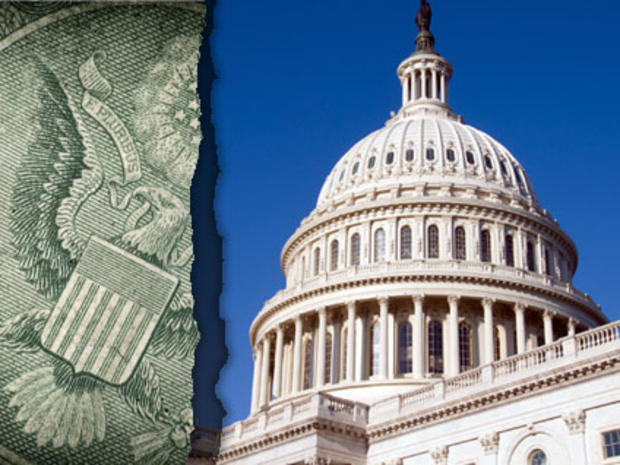Deficit Plan Fails to Get Enough Votes to Advance on Capitol Hill
Updated at 12:40 p.m. ET
President Obama's bipartisan deficit commission failed to garner the 14 votes needed to officially send its deficit reduction plan to Congress, but the commission leaders expressed optimism about the viability of some of the plan's proposals.
Eleven of the commission's 18 members, including both Democrats and Republicans, voted to endorse the comprehensive but controversial plan. The proposals put forward, which include a mix of tax increases and spending cuts, would theoretically cut $4 trillion from the federal budget over the next decade.
While some of the commission members expressed strong opposition to some of the proposals, nearly all expressed satisifaction with the fact that the commission managed to bring the national deficit to the forefront of national debate.
"We have changed the debate in this country from whether there should be a fiscal plan for this country, to what is the best fiscal plan for this country," said Andy Stern, former president of the Service Employees International Union.
Stern voted against the plan because he said it did not recommend enough investments for the future. Yet he said the plan, written by the commission co-chairs former Clinton White House chief of staff Erskine Bowles and former Republican Senator Alan Simpson of Wyoming, still deserved a vote in Congress.
GOP Sens. Tom Coburn and Mike Crapo Back Deficit-Reduction ProposalDeficit Plan Proves Offensive to All, Leaders Admit, but Plan Gets Some Support
Deficit Panel Leaders Unveil "Moment of Truth" Plan (Full Text)
"It's not a question of if, it's a question of when we are going to get this done," Stern said. "This is the issue of our time."
Mr. Obama today praised the work of the deficit commission for "highlighting the magnitude of the challenge before us, and outlining an array of options to confront it."
He said that he and his economic team will study the proposals in the coming weeks as they develop their budget priorities for the coming year.
Simpson expressed confidence that at least some of the ideas would receive consideration. "We took a big banana and threw it into the gorilla cage," he said. "The gorilla has picked it up. They peel it, mash it, play with it, but they will eat some. Many pieces of this will be digested and nourish this country."
Senate Majority Leader Harry Reid and House Speaker Nancy Pelosi both promised to hold a vote on the proposal if it received the support of 14 commission members. They still could choose to take up the proposal for a vote. House Republican Leader John Boehner, who will become House speaker next year, has not promised to hold a vote on the report.
Still, some members of the deficit commission said Congress -- particularly Republicans -- cannot be serious about reducing the deficit while endorsing an extension of the Bush tax cuts for the wealthiest Americans. Congress intends to extend at least some of the tax cuts before the year is up. Making all of the tax cuts permanent would cost $3.7 trillion over a decade, according to the Treasury Department -- coincidentally on par with how much the deficit commission is trying to cut from the budget.
Democratic Sen. Dick Durbin of Illinois concurred that it was irresponsible for Republicans to call for an extension of all the tax cuts. Democrats, by comparison, have suggested extending them for everyone except for those making over $200,000 or families making more than $250,000. The difference between the Democratic and Republican plans is $700 billion. A new CBS News poll shows that most Americans agree with the Democratic plan.
"It's $700 billion added to the deficit to give tax cuts to the wealthiest Americans," Durbin said. "If we're serious about the budget deficit on both sides, we should acknowledge that reality."
Durbin said that, in spite of his reservations about the deficit reduction plan, he was voting in favor it because "politicians on the left and right have to acknowledge the deficit crisis this nation faces."
However, he added that if the plan were to go before Congress, he would vote against it. "I fear this proposal as written takes too much away from proposals that support the neediest," he said.
The report includes proposals for dramatic reductions in income tax rates (but also the elimination of several tax deductions), a doubling of the gas tax, cuts to Medicare, raising the retirement age and other changes to Social Security, cuts to agricultural subsidies, the elimination of a major part of the Democrats' health care overhaul, and a number of other dramatic ideas.
Democratic Rep. Xavier Becerra of California said he was voting against the plan because it required too much sacrifice from middle and lower income Americans while lowering all the income tax brackets. He said it was unjustifiable for Republicans to endorse lower taxes after enacting costly proposals over the past decade, such as the wars in Iraq and Afghanistan and President Bush's Medicare Part D plan, without paying for them.
Congress shouldn't lower taxes for wealthy Americans because "we need to pay for all the things you wanted to do, like go to Iraq, a prescription drug plan, go to Afghanistan," he said.
Tough Choices: Cutting Medicare's Rising Costs
$14 Trillion in Debt - Why You Should Care
The 11 commission members who voted in favor of the report include: co-chair Alan Simpson; co-chair Erskine Bowles; Sen. Kent Conrad (D-N.D.); David Cote, Chairman and CEO, Honeywell International; Alice Rivlin, Senior Fellow, Brookings Institute and former Director, Office of Management & Budget; Ann Fudge, Former CEO, Young & Rubicam Brands; Sen. Judd Gregg (R-N.H.), Sen. Tom Coburn (R-Okla.); Sen. Mike Crapo (R-Idaho); Rep. John Spratt (D-S.C.); and Sen. Richard Durbin (D-Ill.).
The seven commission members who voted against it include: Rep. Jan Schakowsky (D-Ill.); Rep. Paul Ryan (R-Wisc.); Sen. Max Baucus (D-Mont.); Rep. Dave Camp (R-Mich.); Rep. Xavier Becerra (D-Calif.); Rep. Jeb Hensarling (R-Texas); and Andrew Stern, former President, Service Employees International Union.


